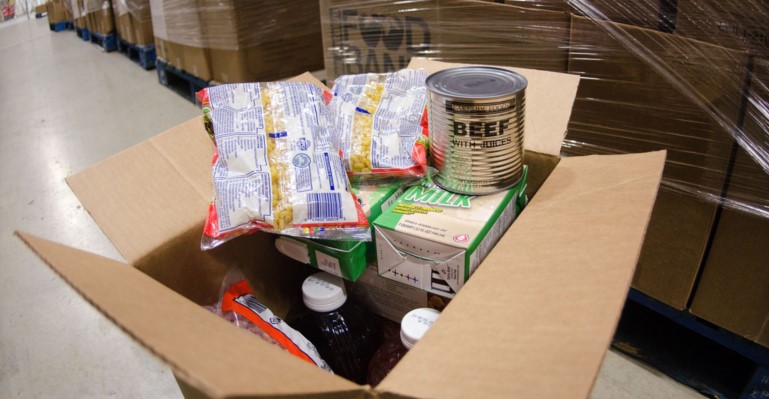Farmers stand ready to meet food bank shortages
Changes suggested range from implementing USDA-run voucher system to redirecting food surpluses to those who need it.

As food banks struggle to keep up with dramatic increases in demand due to the COVID-19 pandemic, farmers and ranchers are eager to work with the U.S. Department of Agriculture to bridge the supply gap and get farm products to those in need, according to a letter from the American Farm Bureau Federation and Feeding America.
The organizations praised USDA’s leadership through this crisis and offered recommendations for additional steps to ensure that food banks across America are stocked, which would allow farmers and ranchers to expand on existing partnerships with food banks and respond to shifting demands and pressing needs. While demand has increased across the supply chain and store shelves have emptied from panic buying, food banks are seeing as much as a 100% increase in demand.
According to the Farm Bureau/Feeding America proposal, however, this demand can be met by redirecting supply from farmers and ranchers who have lost other markets such as restaurants and tourism businesses due to closures and stay-at-home orders by implementing a USDA-run voucher system. This plan would allow farmers and ranchers to work directly with food banks to get farm-fresh products to families in need quickly while also preventing food waste and helping farmers recoup some of their production costs at a time when they are fighting to hold on.
“This is an opportunity for USDA to act quickly to produce a win for food banks and a win for farmers,” the letter states. “It’s a chance for government to serve as a facilitator while clearing bureaucracy and red tape, which fits well within the philosophy you have followed in your leadership of the department.”
In an April 14 statement, the National Pork Producers Council (NPPC) made a request for more than $1 billion in pork purchases by USDA to clear out a backed-up meat supply, supplementing agency food bank programs facing increased demand due to rising unemployment. “These purchases should accommodate pork products packaged for restaurants and other segments of the food services market,” NPPC said.
In a letter to Agriculture Secretary Sonny Perdue on Tuesday morning, House Agriculture Committee chairman Collin Peterson (D., Minn.) urged the Administration to maximize the purchase of agricultural commodities for donation and distribution to aid hungry Americans and struggling farmers during the ongoing coronavirus pandemic.
“The pictures and video of milk being dumped and fresh vegetables being plowed into the ground is unsettling to most Americans, but it is heartbreaking for those farm families that produced that commodity,” Peterson said, adding that USDA's purchase of those products can “help ensure that the production that no longer has a foodservice market can be made available to help our nation’s foodbanks.”
In the letter, Peterson urged the Administration to use the $9.5 billion in funding through the Coronavirus Aid, Relief & Economic Security (CARES) Act, as well as the authorities of the Commodity Credit Corp. (CCC) and Section 32.
“The agricultural economy was already in a fragile state from several years of adverse weather conditions and our challenging trade situation. Despite being an essential service, our ag producers and their supply chain partners are facing the total loss of some market segments and the inability to quickly change their marketing and processing capabilities to meet the new realities,” Peterson added.
Industry efforts
The United Fresh Start Foundation has infused the fresh produce industry with 25 COVID-19 Rapid Response FRESH Grants of $1,000 each to increase access to fresh fruits and vegetables for children and families in need while also creating opportunities for foodservice distributors experiencing lost markets due to the restaurant, hospitality and school shutdowns.
“During this time of crisis, we’re honored to be able to ensure that 25 more communities will have access to fresh fruits and vegetables,” said Lisa McNeece, vice president, foodservice and industrial sales, at Grimmway Enterprises Inc. and chair of the United Fresh Start Foundation board of trustees. “We praise all of the companies across the supply chain working within their communities to broaden access to fresh fruits and vegetables, despite their own economic hardships.”
States are also taking action to help procure food. For instance, Ohio Gov. Mike DeWine signed an executive order to provide nearly $5 million in emergency funding for food banks in the state. This funding, requested by the Ohio Association of Foodbanks, would allow Ohio’s 12 Feeding America foodbanks and its statewide pantry network of 3,600 local organizations to immediately procure nutritious milk and dairy products as well as other food and essential items to feed families in need.
As part of Michigan Farm Bureau’s statewide We’re in This Together initiative, Farm Bureau Insurance announced that, with generous donations from farmers, insurance agents, members, employees and county farm bureaus, the Farm Bureau Family of Companies donated 1.1 million meals' worth of support to families affected by the COVID-19 pandemic. The Million Meal Challenge raised $183,340 – each dollar raised equaling six meals – which will be donated to the seven regional food banks in Michigan, benefitting all 83 counties.
About the Author(s)
You May Also Like





